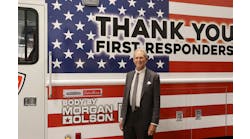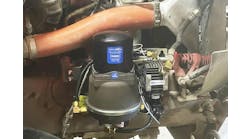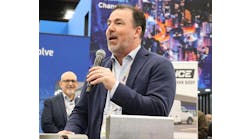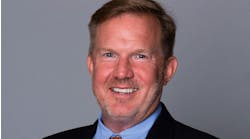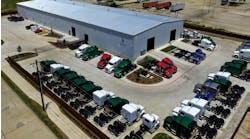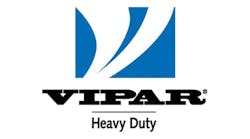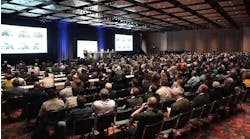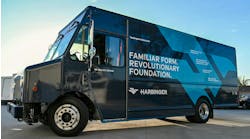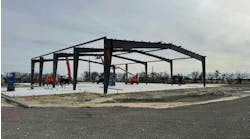It should come as no surprise to anyone in the business, but the discussion during this year’s aftermarket distributor panel revolved around customer service, the relationship with truck OEMs and parts suppliers, and finding, training, and retaining technicians and parts counter experts.
Led by MacKay & Company’s John Blodgett and HDMA President and COO Tim Kraus, the panel featured Chris Baer, president and CEO of VIPAR Heavy Duty; Ryan Hadley, executive vice president of fixed operations, Premier Truck Group; Greg Klein, president and CEO, Inland Truck Parts; and Tom Wiers, CEO, Wiers Fleet Partners.
On OE, all-makes, and white box parts
Parts have long been available in a range of price points, from OEM replacement to “value” brands to “white box.”
Baer reported that VIPAR has a supplier advisory council that focuses on “end user strategies” and how to improve the company’s value proposition.
“Along the way we did a brand survey, and somewhere north of 85% of our distributors are still selling premium brands, so we’ve really made our living and had our success with premium brands,” Baer said. “While every store isn’t the same, in general we lead with premium brands. The challenge is that some of that alternative brand position is here to stay, depending on the category.
“We’re not a big proponent of private labels, but we find ourselves in a position now where we have to be smart as far as what we’re sourcing. I think the independent distributor, maybe initially, got criticized for private brands. But ironically, it’s the OEM customers that are now driving a stronger private label offering on the independent side.”
Weirs, who owns several International dealerships and the Wiers Fleet Partners service business, notes some key differences between the parts operations.
“We’ve seen nice growth in our Fleetrite (a Navistar brand) product that’s been around a long time, an established name,” Weir said. “On the independent side, we have a large concentration of vocational customers. And, typically, a lot of people managing those trucks aren’t brand experts, so they’re relying on us to fix the truck properly at a reasonable cost.
“They don’t necessarily advocate for any type of brand to replace parts. But internally, as a dealer, when we put a part on a truck, Navistar’s covering the parts and labor warranty on that. On the independent side, a lot of times our vendors will provide the parts warranty but we’re providing the labor warranty—so when our staff see parts failures and they’re absorbing those costs, they get a little more sensitive about what products they’re using. We want to make sure of the quality of the part, not only for the customer’s benefit but so that we’re not eating the labor portion on a failure.”
Premier Truck Group’s stores carry OEM original parts along with products from Daimler’s Alliance all-makes brand.
“The majority of the time when the customer comes in, they’re relying on the expertise of the person across the counter,” Hadley said. “And occasionally, that customer is going to say, ‘wait a minute, that seems a little high. Is there something else that you have to offer?’ We provide them one product up front that maybe would be from a premium vendor, and then maybe the second option would be still a good product but a lower price point.
“The strategy from the Alliance team has always been to source a good product at a fair price. From a private label branding perspective, I think it really comes down to availability and quality.”
Inland Truck Parts, a large distributor with sales and service shops as well as a component repair and reman operation, has taken a somewhat different approach.
“We’ve tried to create something of an Inland brand with private label boxing on some of our parts,” Klein said. “I’m not going to say none of our customers care about the product and where it came from, but we’ve found many customers don’t necessarily pay a lot of attention to what they’re buying from us. What they really care about is that somebody’s going to stand behind it. And they didn’t buy it from our supplier, they bought it from us.
“So we warranty it before we ever contact the manufacturer. And then we go back to the manufacturer if we think that it was their issue versus our issue. But I do think we’ll continue to push toward the direction of expanding our private label Inland brand because it’s not selling on price, it’s selling on value. And that value is uptime and standing behind the product, and having a good experience when they come in.
“We consume a lot of our own parts in the shops, so the customer may never see the box. But when they do buy it over the counter, more and more of our products now have our own name on it if we can.”
On techs, training
Premier’s Hadley concedes that finding “good people” has always been a challenge.
“We want it to be tough to get in, but we want it to be tougher for someone to leave,” Hadley said. “So we want to make sure we spend the time upfront to get the right candidate, and then invest the time in training those individuals. If you stay with us, we’ll make it a good place to work.
“The biggest challenge for us is technicians. We’re out there in all the training schools trying to get them interested in us so, hopefully, we can get them to come to work for us when they graduate.”
With 320 technicians spread across 39 locations in 14 states, Inland Truck Parts created a free-standing training center in Kansas City, a central location staffed by five fulltime trainers.
“If you don’t train, just flip the hourglass and the sand is running—because whatever knowledge your techs have at that point is all they’re ever going to have,” Klein said. “So as times change and technologies change, you’ve got to train on whatever’s coming out or you’re just going to become stale.
“Techs love training, they want training. We tried for years to do it in our stores or at our vendors, and we still do some of that, but it’s really hard to train in the stores when the business is open. You can’t keep their attention. They’re always getting pulled off. It is quite an expense, moving them around to get them to the training center; but if you can get them out of the store for about three days, we find that’s about enough for them to learn something and not enough where they start getting real distracted with getting back home.”
On counter expertise
Even as racks of parts catalogs are being replaced by online systems, having a parts expert at the counter remains critical to success in the aftermarket business. But the transition is underway.
“In most cases, we’re relying a lot on the vendors to provide product support and training for our counter people and outside sales personnel,” Premier’s Hadley said. “We also have a source that DTNA provides to give us product information on specific vendors that they utilize. It’s an electronic source that allows us to go in and select different areas on vehicle and drill down to different suppliers for specific product information.”
VIPAR likewise relies on manufacturer support.
“We also have a fairly simple but robust communication platform, so we really encourage the suppliers to get this information to us in a format that we can easily communicate,” Baer said.
Inland has taken further steps. Klein noted that counter expertise is especially important in an independent shop, where parts numbers may not readily available without an OEM database and VIN lookup capability.
“You need somebody on that counter to figure that stuff out, and figure out where to get it if you don’t have it. Some of it’s pretty hard to find. So we’ve invested heavily in the last seven years converting to a new computer system. I don’t know if anybody’s ever converted their computer system, but if you haven’t started yet, don’t,” Klein quipped. “They’ll tell you it’s going to take this long and cost this much, but it’s going to take longer and cost more.
“The goal, ultimately, is to try to capture what’s in these guys’ and gals’ heads on that computer. Because otherwise, the training is learning by osmosis: the 40-year person teaching the one-year person over time. And it’s very difficult to find training for some of this hard-to-solve stuff.
“People don’t want to sell anything they’re not really comfortable with, because they don’t want to mess it up. But if they understand it, they can sell it. So before these folks that know these things get out of the company, we’re trying to pass that on through our training center. It’s not straightforward, and it’s not easy, but you’ve got to try.”
